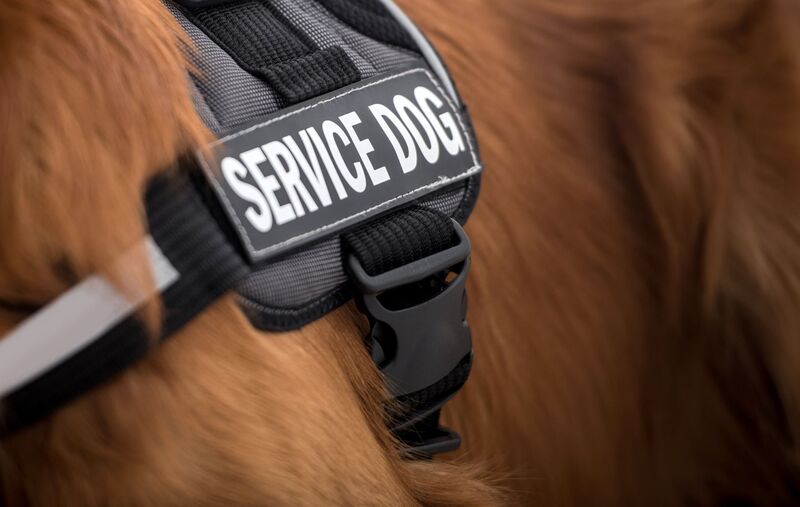
We receive questions about service animals all the time, and this certainly isn’t the first blog post we’ve published about service animals. The questions are usually inquiring about the differences between service animals and emotional support animals, what do to if someone is misrepresenting a service animal, and where to go for service animal certification.
It’s important to start by saying that under the ADA, across the board, there is no official registry, certification, badge, vest, or other documentation or equipment that makes a service animal a service animal. Many service animals do wear vests and undergo professional training, which can be very helpful, but it’s not required by the ADA. Requiring handlers to put their dogs through professional training or obtain certain equipment could create barriers for people with disabilities, and the ADA strives to remove those kinds of barriers.
Now, there is an instance where documentation may be required in relation to service animals under the ADA. This is where the difference between Titles I, II, and III come into play. “Titles” are like sections of the ADA. Each Title sets non-discrimination requirements for different areas of public life. Title I covers employment, Title II covers state and local government services, and Title III covers places of public accommodation (which are generally private businesses that serve the public). Service animals are regarded differently under these different sections of the ADA. Let’s take a look.
Titles II and III:
Under Titles II and III of the ADA, service animals are specifically defined as dogs and miniature horses that are trained to perform tasks directly related to a person’s disability. Animals that meet this definition should generally be granted access into public places if they are housebroken and under the control of their handlers. When someone brings a service animal into ADA-covered public spaces—such as restaurants, grocery stores, or DMVs, just to name a few—service providers cannot ask for any kind of documentation showing the animal’s standing as a service animal. As mentioned, this kind of documentation does not exist.
Title I:
Under Title I, however, there may be certain situations where people must provide documentation in relation to their service animals. However, still, this documentation is not to show that an animal is “ADA registered.” Rather, when someone wants to bring a service animal into the workplace, the person is requesting a reasonable accommodation. A reasonable accommodation is a change in the work environment or in the way things are customarily done that enables an individual with a disability to enjoy equal employment opportunities. When a current or prospective employee requests a reasonable accommodation in the workplace and the need for an accommodation is not obvious, an employer may ask for documentation to establish that a person has a disability, and that the disability necessitates a reasonable accommodation. So, an employer could legally ask for documentation from someone requesting to bring a service animal to work. Someone may even ask to bring their emotional support animal to work, which could also be granted as a reasonable accommodation. Again, the employer cannot request proof that an animal is a service animal. Under Title I, such proof still does not exist. Rather, the documentation relates to someone’s disability and need for an accommodation. This is the case for all reasonable accommodation requests, such as someone requesting to work from home or use assistive technology.
The nature of the ADA is that it is not one-size-fits-all. If you have any questions about your particular situation involving service animals, reach out to us or visit the helpful resources below.
Resources:
Department of Justice — ADA Requirements: Service Animals
Job Accommodation Network — Service Animals
Rocky Mountain ADA Center Video — Service Animals in the Workplace & Title I of the ADA
Rocky Mountain ADA Center Online Course — Service Animals and the ADA
Rocky Mountain ADA Center Online Course — Service Animals in the Workplace